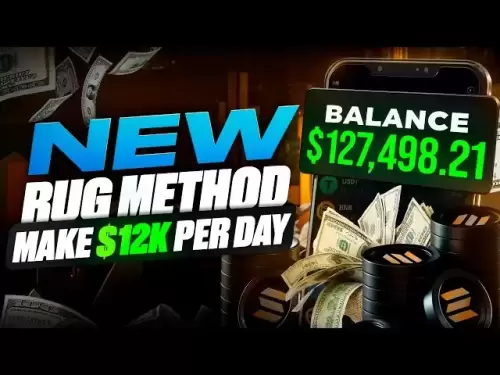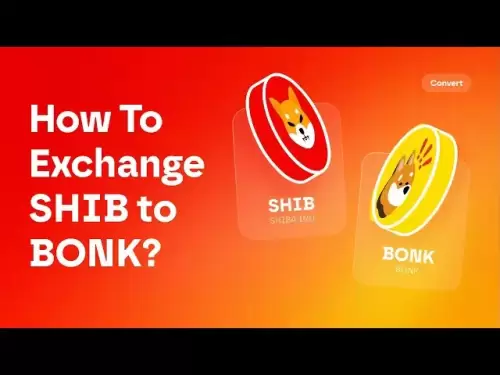-
 Bitcoin
Bitcoin $112400
-1.07% -
 Ethereum
Ethereum $3409
-3.27% -
 XRP
XRP $2.784
-6.60% -
 Tether USDt
Tether USDt $0.9997
-0.03% -
 BNB
BNB $739.3
-2.09% -
 Solana
Solana $158.0
-2.90% -
 USDC
USDC $0.9998
-0.02% -
 TRON
TRON $0.3213
-0.94% -
 Dogecoin
Dogecoin $0.1929
-5.01% -
 Cardano
Cardano $0.6974
-2.82% -
 Hyperliquid
Hyperliquid $36.69
-2.31% -
 Sui
Sui $3.327
-4.80% -
 Stellar
Stellar $0.3672
-5.18% -
 Chainlink
Chainlink $15.65
-3.07% -
 Bitcoin Cash
Bitcoin Cash $525.0
-1.68% -
 Hedera
Hedera $0.2291
-6.00% -
 Avalanche
Avalanche $20.91
-2.96% -
 Ethena USDe
Ethena USDe $1.000
0.00% -
 Toncoin
Toncoin $3.520
-1.12% -
 UNUS SED LEO
UNUS SED LEO $8.968
0.14% -
 Litecoin
Litecoin $105.7
0.26% -
 Shiba Inu
Shiba Inu $0.00001181
-1.79% -
 Polkadot
Polkadot $3.492
-2.08% -
 Uniswap
Uniswap $8.800
-3.10% -
 Dai
Dai $0.9999
-0.01% -
 Monero
Monero $289.9
-3.17% -
 Bitget Token
Bitget Token $4.243
-1.27% -
 Pepe
Pepe $0.00001006
-3.67% -
 Cronos
Cronos $0.1248
-5.68% -
 Aave
Aave $249.7
-2.50%
What to do if Trust Wallet transfers are not received?
If Trust Wallet transfers are not received, check the transaction status on the blockchain, verify the wallet address and network, ensure sufficient gas fees, and contact support if needed.
May 19, 2025 at 03:15 am
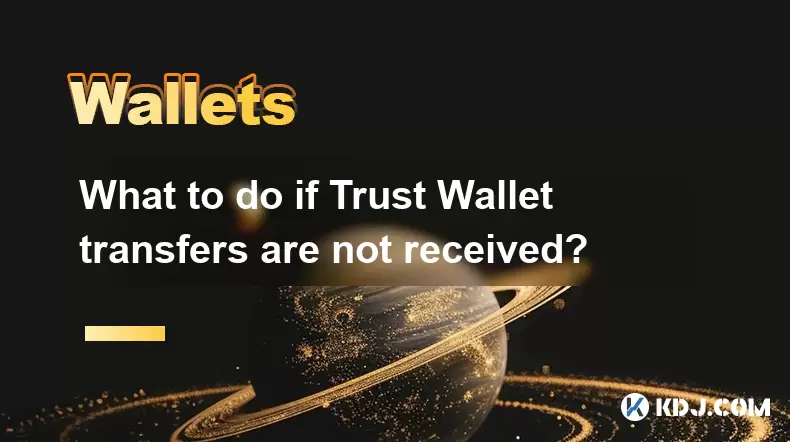
If you find yourself in a situation where your Trust Wallet transfers are not received, it can be frustrating and concerning. Understanding the potential reasons behind this issue and knowing the steps to resolve it is crucial. This article will guide you through the process of troubleshooting and resolving issues with Trust Wallet transfers not being received.
Check Transaction Status on the Blockchain
The first step in resolving an issue with a transfer not being received in Trust Wallet is to check the transaction status on the blockchain. This will help you understand if the transaction has been successfully broadcasted and confirmed.
- Open a blockchain explorer for the specific cryptocurrency you are dealing with. For example, use Etherscan for Ethereum transactions, BscScan for BNB Smart Chain transactions, or Bitcoin's Blockchain.com for Bitcoin transactions.
- Enter your transaction hash (TXID) into the search bar of the blockchain explorer. You can find the TXID in your Trust Wallet under the transaction history.
- Review the transaction details to see if the transaction has been confirmed. If it shows as "Pending" or "Unconfirmed," it means the transaction is still processing and has not yet been added to the blockchain.
- Wait for a reasonable amount of time depending on the network congestion and the specific cryptocurrency's average confirmation time. Ethereum transactions, for instance, typically require 12 to 15 confirmations, while Bitcoin transactions may need 6 confirmations.
Verify Wallet Address and Network
A common reason for transfers not being received is an incorrect wallet address or selecting the wrong network. Ensure that the wallet address you used to send the funds is correct and that you selected the appropriate network.
- Double-check the recipient's wallet address to make sure it matches exactly. A single incorrect character can result in funds being sent to the wrong address.
- Confirm that you selected the correct network when sending the transaction. For example, if you are sending BNB, make sure you selected the BNB Smart Chain network and not the BNB Beacon Chain.
- If you realize you used the wrong network, contact Trust Wallet support immediately for assistance, as this could result in lost funds.
Check for Sufficient Gas Fees
Another reason your transfer might not be received is insufficient gas fees. Ensure that you included enough gas fees to incentivize miners to process your transaction.
- Review the gas fee you set for the transaction. If it was too low, miners might not have prioritized your transaction, causing it to remain pending.
- If you notice that your transaction is stuck due to low gas fees, you can attempt to speed up or cancel the transaction within Trust Wallet.
- To speed up the transaction, go to the transaction in your transaction history, and if the option is available, select "Speed Up" to increase the gas fee.
- To cancel the transaction, go to the transaction in your transaction history, and if the option is available, select "Cancel" to replace the transaction with a higher gas fee that cancels the original one.
Contact Trust Wallet Support
If you have checked the transaction status, verified the wallet address and network, and ensured sufficient gas fees, yet your transfer is still not received, it's time to contact Trust Wallet support.
- Visit the Trust Wallet support page on their website.
- Submit a support ticket detailing your issue, including the transaction hash, the amount sent, the recipient's address, and any error messages you received.
- Wait for a response from the Trust Wallet support team, who will guide you through further troubleshooting steps or escalate the issue if necessary.
Check for Network Congestion
Sometimes, delays in receiving transfers can be due to network congestion. This is particularly common during times of high transaction volume on the blockchain.
- Monitor the network status of the blockchain you are using. Websites like Etherscan or BscScan provide real-time data on network congestion.
- If the network is congested, it may take longer for your transaction to be processed and confirmed. Be patient and allow additional time for the transaction to be received.
Review Transaction History in Trust Wallet
Finally, review your transaction history within Trust Wallet to ensure that the transaction was indeed sent and not just a display error.
- Open Trust Wallet and navigate to the "Transactions" tab.
- Locate the specific transaction in question and check its status. If it shows as "Sent" but you have not received it, follow the steps mentioned earlier to troubleshoot further.
Frequently Asked Questions
Q: Can I recover funds sent to the wrong address?
A: Unfortunately, transactions on the blockchain are irreversible. If you sent funds to the wrong address, there is no way to recover them directly. However, if the recipient is known and cooperative, they might be able to return the funds to you.
Q: How long should I wait for a transaction to be confirmed?
A: The confirmation time varies depending on the cryptocurrency and network congestion. For Ethereum, it typically takes 12 to 15 confirmations, which can take around 3 to 5 minutes per confirmation. Bitcoin transactions may require 6 confirmations, which can take about an hour.
Q: What should I do if my transaction remains "Pending" for an extended period?
A: If your transaction remains "Pending" for an extended period, first check the network congestion. If the network is not congested, you may need to increase the gas fee to speed up the transaction or cancel it if possible. If these options are not available, contact Trust Wallet support for further assistance.
Q: Is there a way to avoid transaction delays in the future?
A: To minimize the risk of transaction delays, always ensure you set an appropriate gas fee based on current network conditions, double-check the recipient's address, and select the correct network for the transaction. Additionally, consider using a blockchain explorer to monitor your transaction's progress.
Disclaimer:info@kdj.com
The information provided is not trading advice. kdj.com does not assume any responsibility for any investments made based on the information provided in this article. Cryptocurrencies are highly volatile and it is highly recommended that you invest with caution after thorough research!
If you believe that the content used on this website infringes your copyright, please contact us immediately (info@kdj.com) and we will delete it promptly.
- BlockDAG, SEI, Ethena: Top Crypto Performers Under the Microscope
- 2025-08-03 10:50:16
- Bitcoin Blasts Past $119K: How Institutional Adoption and Macro Shifts Fuel the Fire
- 2025-08-03 10:55:16
- Crypto, Grok, and August: Decoding the Latest Trends and Insights
- 2025-08-03 11:10:16
- Crypto, Phishing, and Your Wallet: A New Yorker's Guide to Staying Safe
- 2025-08-03 10:30:16
- Troller Cat Meme Coin Presale Soars: A New King in the Crypto Jungle?
- 2025-08-03 10:30:16
- Grayscale, Altcoin Trust, and Mid-Cap Mania: What's the Deal?
- 2025-08-03 08:50:16
Related knowledge

What is a watch-only wallet in Trust Wallet?
Aug 02,2025 at 03:36am
Understanding the Concept of a Watch-Only WalletA watch-only wallet in Trust Wallet allows users to monitor a cryptocurrency address without having ac...

How to fix a stuck pending transaction in Trust Wallet?
Aug 03,2025 at 06:14am
Understanding Why Transactions Get Stuck in Trust WalletWhen using Trust Wallet, users may occasionally encounter a pending transaction that appears t...

What is a multi-coin wallet in Trust Wallet?
Aug 03,2025 at 04:43am
Understanding Multi-Coin Wallets in Trust WalletA multi-coin wallet in Trust Wallet refers to a digital wallet that supports multiple cryptocurrencies...

How to switch between networks in Trust Wallet?
Aug 02,2025 at 12:36pm
Understanding Network Switching in Trust WalletSwitching between networks in Trust Wallet allows users to manage assets across different blockchains s...
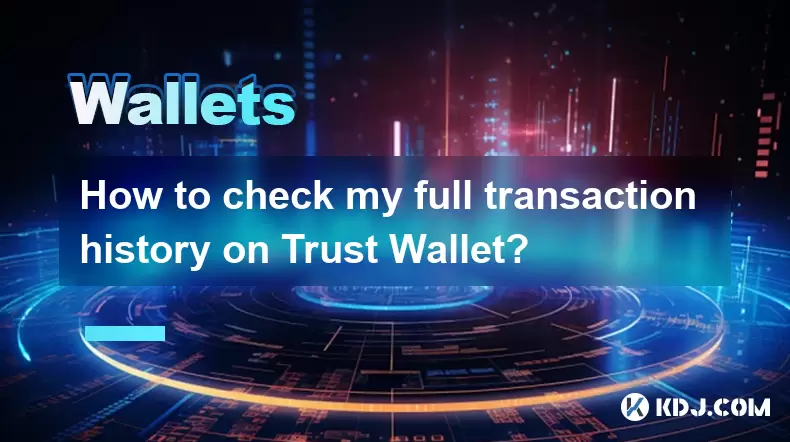
How to check my full transaction history on Trust Wallet?
Aug 02,2025 at 09:24am
Understanding Transaction History in Trust WalletTrust Wallet is a widely used non-custodial cryptocurrency wallet that supports a broad range of bloc...
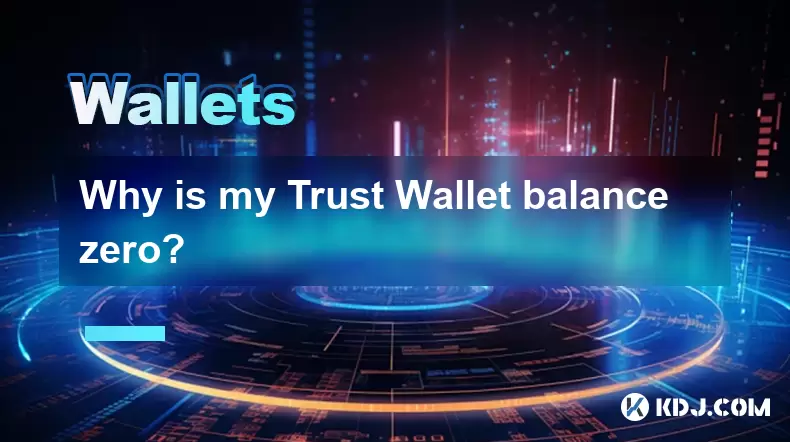
Why is my Trust Wallet balance zero?
Aug 02,2025 at 03:49am
Understanding Trust Wallet Balance Display IssuesIf you're seeing a zero balance in your Trust Wallet despite knowing you've previously received or se...

What is a watch-only wallet in Trust Wallet?
Aug 02,2025 at 03:36am
Understanding the Concept of a Watch-Only WalletA watch-only wallet in Trust Wallet allows users to monitor a cryptocurrency address without having ac...

How to fix a stuck pending transaction in Trust Wallet?
Aug 03,2025 at 06:14am
Understanding Why Transactions Get Stuck in Trust WalletWhen using Trust Wallet, users may occasionally encounter a pending transaction that appears t...

What is a multi-coin wallet in Trust Wallet?
Aug 03,2025 at 04:43am
Understanding Multi-Coin Wallets in Trust WalletA multi-coin wallet in Trust Wallet refers to a digital wallet that supports multiple cryptocurrencies...

How to switch between networks in Trust Wallet?
Aug 02,2025 at 12:36pm
Understanding Network Switching in Trust WalletSwitching between networks in Trust Wallet allows users to manage assets across different blockchains s...

How to check my full transaction history on Trust Wallet?
Aug 02,2025 at 09:24am
Understanding Transaction History in Trust WalletTrust Wallet is a widely used non-custodial cryptocurrency wallet that supports a broad range of bloc...

Why is my Trust Wallet balance zero?
Aug 02,2025 at 03:49am
Understanding Trust Wallet Balance Display IssuesIf you're seeing a zero balance in your Trust Wallet despite knowing you've previously received or se...
See all articles
























